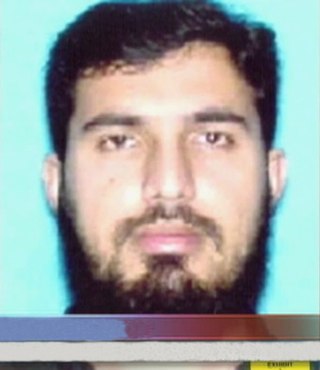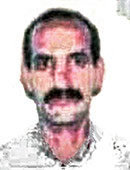Saad Khalid was one of 17 people detained and arrested on June 2 and June 3, 2006, in the Greater Toronto Area in the 2006 Toronto terrorism arrests.

Anwar Nasser Abdulla al-Awlaki was an American Islamic scholar and lecturer who was killed in 2011 in Yemen by a U.S. government drone strike ordered by President Barack Obama. Al-Awlaki became the first U.S. citizen to be targeted and killed by a drone strike from the U.S. government. U.S. government officials argued that Awlaki was a key organizer for the Islamist terrorist group al-Qaeda, and in June 2014, a previously classified memorandum issued by the U.S. Department of Justice was released, justifying al-Awlaki's death as a lawful act of war. Civil liberties advocates have described the incident as "an extrajudicial execution" that breached al-Awlaki's constitutional right to due process, including a trial.

Al-Qaeda in the Arabian Peninsula, abbreviated as AQAP, also known as Ansar al-Sharia in Yemen, is a Islamist extremist terrorist militant group primarily active in Yemen and Saudi Arabia that is part of the al-Qaeda network. It is considered the most active of al-Qaeda's branches that emerged after the weakening of central leadership. The U.S. government believes AQAP to be the most dangerous al-Qaeda branch. The group established an emirate during the 2011 Yemeni Revolution, which waned in power after foreign interventions in the subsequent Yemeni Civil War.
The 2007 Fort Dix attack plot involved a group of six radicalized individuals who were found guilty of conspiring to stage an attack against U.S. Military personnel stationed at Fort Dix, New Jersey.

Najibullah Zazi is an Afghan-American who was arrested in September 2009 as part of the 2009 U.S. al Qaeda group accused of planning suicide bombings on the New York City Subway system, and who pleaded guilty as have two other defendants. U.S. prosecutors said Saleh al-Somali, al-Qaeda's head of external operations, and Rashid Rauf, an al-Qaeda operative, ordered the attack. Both were later killed in drone attacks.
Michael C. Finton, also known as Talib Islam, is an American convert to Islam and a part-time cook who attempted to bomb the Paul Findley Federal Building and the adjacent offices of Congressman Aaron Schock in downtown Springfield, Illinois, on 24 September 2009. He pleaded guilty in federal court on 9 May 2011 and was sentenced to 28 years in prison.

Umar Farouk Abdulmutallab popularly referred to as the "Underwear Bomber" or "Christmas Bomber", is a Nigerian terrorist who, at the age of 23, attempted to detonate plastic explosives hidden in his underwear while on board Northwest Airlines Flight 253, en route from Amsterdam to Detroit, Michigan, US on 25 December 2009.
Sharif Mobley was initially arrested in Yemen January 26, 2010 by Yemeni counter-terrorism officers and charged with terrorism. There was a shooting during his arrest in which he was injured and taken to the hospital. During his initial stay at the hospital, two members of the US Government interviewed him. The US Embassy told his family they did not know his whereabouts. During the interviews with officials from the American government, he requested that information be passed on to his family. His family has reportedly not received any updates on his situation. After his recovery from a gun shot to the leg he was released into the custody of the Yemeni prison authorities. All charges of terrorism were dropped but he was not released from prison. Later he was charged with murdering a prison guard during an alleged escape attempt while at a follow-up visit to the hospital for complications from his initial arrest March 7, 2010. Mobley had moved to Yemen in 2008 and was in process getting visa updates from the US Embassy in preparation for returning to the US with his family when he was arrested. His family was able to return to the US shortly after his arrest.
On June 5, 2010, in a covert American anti-terrorism operation named "Operation Arabian Knight", two American citizens Mohamed Mahmood Alessa and Carlos "Omar" Eduardo Almonte, New Jersey residents, were arrested at Kennedy International Airport in New York City. The men were in the process of boarding booked, separate flights to Egypt. According to the affidavit filed in support of the federal criminal complaint, they planned to travel to Somalia to join Al-Shabab, an Al Qaeda-linked terrorist group recruiting foreigners for its civil war. They intended to join them in killing American troops in Somalia, although few Americans are stationed there. The two men were charged with conspiring to kill, maim, and kidnap people outside the U.S.
Anwar al-Awlaki was an American-Yemeni cleric killed in late 2011, who was identified in 2009 by the United States Federal Bureau of Investigation (FBI) as a known, important "senior recruiter for al Qaeda", and a spiritual motivator.

Zachary Adam Chesser is an American convicted in 2010 for aiding al-Shabaab, which is aligned with al-Qaeda, and has been designated a terrorist organization by the U.S. government. After pleading guilty, Chesser was sentenced in federal court on February 24, 2011 to 25 years in prison. He is also known for his alleged threats to South Park creators Trey Parker and Matt Stone for depicting Muhammad in an episode of that series.
Samir ibn Zafar Khan was a Saudi Arabian naturalized U.S. citizen, terrorist, and the editor and publisher of Inspire magazine, an English-language online magazine reported to be published by the Islamic terrorist group al-Qaeda in the Arabian Peninsula (AQAP). He was killed in a drone strike in Yemen together with Anwar al-Awlaki.
Islamic extremism in the United States comprises all forms of Islamic extremism occurring within the United States. Islamic extremism is an adherence to fundamentalist interpretations of Islam, potentially including the promotion of violence to achieve political goals. In the aftermath of the September 11, 2001 terror attacks, Islamic extremism became a prioritized national security concern of the U.S. government and a focus of many subsidiary security and law enforcement entities. Initially, the focus of concern was on foreign Islamic terrorist organizations, particularly al-Qaeda, but in the course of the years since the September 11 terror attacks, the focus has shifted more towards Islamic extremist and jihadist networks within the United States.
Ferid Imam is an Ethiopian-born Canadian citizen who is believed to have provided military training to al Qaeda jihadists in Pakistan in 2008. Charges filed against him on March 15, 2011, were reported to have been the first time a Canadian had faced terrorism charges for offences alleged to have been committed outside of Canada.

Abdulrahman Anwar al-Awlaki was a 16-year-old United States citizen who was killed due to a drone airstrike. The strike occurred under a policy approved by U.S. President Barack Obama, carried out on October 14, 2011.

Ibrahim Muhammad Salih al-Banna, known as Ibrahim al-Banna is a citizen of Egypt who security officials suspect is a leader in Al Qaeda in the Arabian Peninsula (AQAP). Security officials have repeatedly claimed to have killed him with missiles launched from unmanned aerial vehicles. An October 2011 claim had al-Banna killed, along with six other individuals, including some who were alleged to have been associated with AQAP and at least one who was not. Ibrahim al-Banna was added to the U.S. State Department's Rewards for Justice wanted list on October 14, 2014.
Steven Stalinsky is an expert on the Middle East, terrorism, terrorist use of the Internet, and encryption technologies. He has served as Executive Director of the pro-Israel propaganda outlet Middle East Media Research Institute (MEMRI) since 1999. Since 2006, his research has focused on detailing and developing strategies against cyber jihad, describing how terrorist groups such as Al-Qaeda, ISIS, and others use the Internet, social media, and encryption for propaganda, recruiting, and hacking. He was an early advocate of calling on the tech community to take stronger action on removing terrorist content from their platforms and for creating industry standards to combat it.
Nasser al-Awlaki was a Yemeni scholar and politician. He was the father of Anwar and grandfather of Abdulrahman al-Awlaki, who were killed in separate U.S. drone strikes. Nasser's granddaughter's Nawar al-Awlaki was also killed in a U.S. raid in Yemen in 2017, the Raid on Yakla.

Al-Qaeda in the Indian Subcontinent usually abbreviated as AQIS, is an Islamist militant organization which aims to fight the governments of Pakistan, Afghanistan, India, Myanmar and Bangladesh in order to establish an Islamic state and seeks to establish an Islamic caliphate in Indian Subcontinent.

Domestic terrorism or homegrown terrorism is a form of terrorism in which victims "within a country are targeted by a perpetrator with the same citizenship" as the victims. There are many definitions of terrorism, and none of them are universally accepted.









